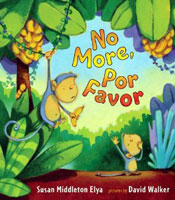Reviews
Kirkus Review
"Finicky eaters abound in this rainforest/selva, in which several bilingual baby animals refuse their normal foods. Bananas are funky for one small Monkey, pomegranate seeds too messy for Baby Toucan, mango too sweet for a young Iguana and the same flower petal over and over is “so lame!” according to Little Butterfly. Elya's signature blended Spanish-with-English couplets highlight a series of dietary complaints summed up best by a tiny hummingbird tired of eating nectar. “ ‘Flowers—no más!' He flits there en frente. / ‘Hummingbird kids need food diferente!' ” Variety proves a spicy solution when one creative mama macaw surprises everyone with a midweek-playgroup fruit ensalada that offers deliciously new choices for all to share. Walker 's acrylic paintings in rich, primary rainforest colors add appeal to the bouncy, sometimes uneven rhyme. Kids with picky palates will appreciate the message and discover new tasty options while training their tongues with morsels of Spanish. An illustrated glossary and pronunciation guide completes the fare. (Picture book. 5-8)"
Contra Costa Times
“No one does bilingual books for young readers with so much zest as Elya. This one centers on a familiar problem – fussy eaters, but it takes place in a tropical forest. Papagayo (a parrot) is among several irritable eaters. He complains, “Papaya for breakfast, for lunch and la cena. Too many times in a row no es buena.” Fortunately, rain forest parents come up with a delicious solution. Walker’s bold, bright acrylic paintings adid this lighthearted picture book.” -- Joanna Kraus (Sunday, 6/13/10)
Scholastic Parent and Child
"No More, Por Favor*
by Susan Middleton Elya
This inventive rhyming tale introduces creatures and fruits of the rainforest —
la selva — along with their Spanish translations. Penguin, $17. Ages 3 and up."
School Library Journal
"No More, Por Favor*
"PreS-Gr 2–All throughout the rainforest, adult and baby animals and birds are having similar conversations. The parents try to encourage their children to eat fruit or blossoms and the youngsters refuse–they just can’t stand one more mouthful of their usual fare. After a lot of complaining, the families meet to join forces and offer the rainforest babies fruit “ensalada.” And what could be better than sharing it? “¡Nada!” The rhyming text is in English with Spanish words sprinkled in, a hallmark of Elya’s work. Each stanza introduces the animal, bird, or insect. However, sometimes the rhyming structure makes it unclear who is speaking. Elya includes a helpful glossary of Spanish vocabulary at the front of the book, including pronunciation. The illustrations are winning, using pastel colors that emphasize the depth and vibrancy of the rainforest. The story seems to go on a bit too long before the final resolution, but it would appeal in a bilingual storytime or in a unit on rainforest animals." --Susan E. Murray, Glendale Public Library, AZ
|













